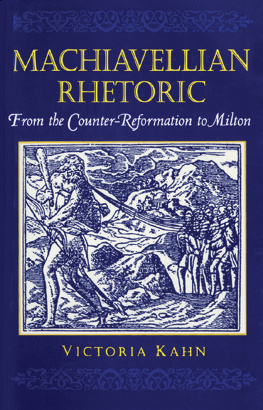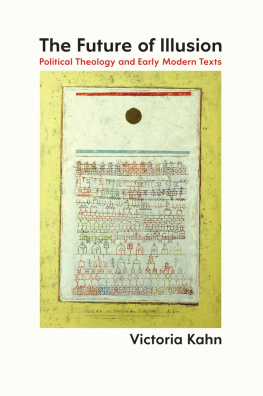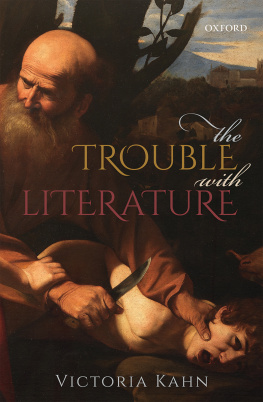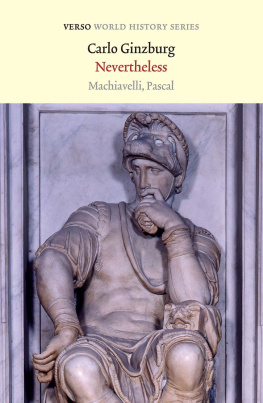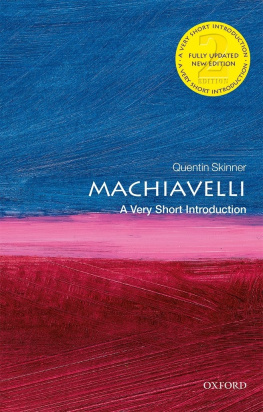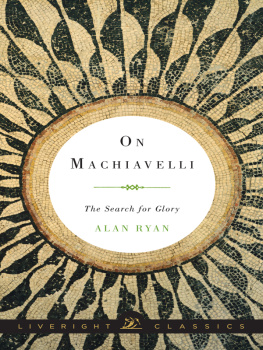MACHIAVELLIAN RHETORIC
MACHIAVELLIAN RHETORIC
FROM THE COUNTER-REFORMATION TO MILTON
Victoria Kahn
PRINCETON UNIVERSITY PRESS
PRINCETON, NEW JERSEY
COPYRIGHT1994 BY PRINCETON UNIVERSITY PRESS
PUBLISHED BY PRINCETON UNIVERSITY PRESS, 41 WILLIAM STREET,
PRINCETON, NEW JERSEY 08540
IN THE UNITED KINGDOM: PRINCETON UNIVERSITY PRESS,
CHICHESTER, WEST SUSSEX
ALL RIGHTS RESERVED
LIBRARY OF CONGRESS CATALOGING-IN-PUBLICATION DATA
KAHN, VICTORIA ANN.
MACHIAVELLIAN RHETORIC : FROM THE COUNTER-REFORMATION TO MILTON / VICTORIA KAHN.
P. CM.
INCLUDES BIBLIOGRAPHICAL REFERENCES AND INDEX
ISBN: 0-691-03491-5 (ALK. PAPER)
1. RHETORIC15001800. 2. MACHIAVELLI, NICCOL,
14691527POLITICAL AND SOCIAL VIEWS. 3. MACHIAVELLI, NICCOL,
14691527CRITICISM AND INTERPRETATION. 4. POLITICS
AND LITERATURE. I. TITLE.
PN173.K33 1994 93-45883 320.1092DC20 CIP
1 3 5 7 9 10 8 6 4 2
eISBN: 978-1-400-82128-0
R0
FOR HELENE SILVERBERG AND NEIL SACCAMANO
PREFACE
T HIS BOOK is about how Machiavelli was read in the Renaissance, what Machiavelli came to symbolize in Renaissance culture, and why. I argue that Machiavelli offered Renaissance writers a rhetoric for thinking about politics, and that once we recover the ways Machiavelli was read, we gain a deeper understanding of how Renaissance thinkers conceptualized and responded to contemporary crises of political and religious authority. Machiavelli was reviled, approved, misrepresented, and appropriated precisely because his work spoke to many of the central concerns of the age: the legitimacy of de facto political power, the role of persuasion in acquiring and maintaining that power, the relationship of force to ethics, and of dispassionate political analysis to criticism of the status quo. In a justly famous book, J.G.A. Pocock defined the Machiavellian moment of early modern political thought as the moment when the secular political agent confronts the difficulties of acting in time and the republic confronts its own temporal finitude (MM, viii). I contend that the Machiavellian moment of Renaissance culture is a rhetorical moment rather than a moment of specifically secular self-consciousness, and that this insight has implications for the way we think about Renaissance political thought and culture in general. In particular, it requires us to revise many of the usual assumptions regarding the incompatibility of humanist rhetoric and serious political analysis, the secularism of Renaissance republicanism, and the irrelevance of the Machiavel to the history of Renaissance political and religious thought.
This book is the counterpart to my earlier work, Rhetoric, Prudence, and Skepticism in the Renaissance. In that book I was concerned with the humanists reception of Aristotles Nicomachean Ethics and with the ways in which the humanists deliberative rhetoric (argument in utramque partem, or on both sides of a question) was designed to reflect and to educate the readers prudential judgment or practical reason. Describing what I now understand as merely one strain of Renaissance humanism, I argued that dialogue and argument on both sides of a question were assumed to foster social and political consensus. Thus while Cicero recognized that such argument in utramque partem could take the form of irony if both sides or points of view were maintained at the same time, for many humanists the ambiguity of irony was held in check by rhetorical and social constraints. For example, Giovanni Pontano, an important humanist at the court of Naples in the fifteenth century, saw Socrates ironic indirection not as an instance of rhetoric that threatens the possibility of community, of shared meaning and action, but rather as a rhetorical invitation to his audience to assume an attitude of ethical moderation. Even more significant, he turned irony into the chief social grace of decorum by identifying it with urbanity. In a move that is characteristic of this consensual strain of humanism, the epistemological threat of skepticism and the political threat of dissent are contained by the practice of social consensus. I then traced the development of such prudential rhetoric from its status as a positive theory of communication allied to Academic skepticism in the work of several early Italian humanists, through the threat to prudence by Pyrrhonist skepticism in the work of Erasmus and Montaigne, and finally to the apparent displacement of prudential rhetoric by logic in Hobbess Leviathan. While I attempted to complicate this narrative by describing it as an allegory of the tensions inherent in humanist rhetoric from the outset, I now see that this rhetorical strategy was quite typical of the strain of humanism I was analyzing, which aimed to exclude whatever would threaten the possibility of consensus or unified interpretation. As I briefly acknowledged in the conclusion to the book, Machiavelli was one of the chief threats both to humanist rhetoric and to my argument.
As Pontano and his contemporaries recognized, the Renaissance counterpart to a consensual view of rhetoric and prudence is astuteness or craftinessa faculty of judgment that is not simply allied with moral virtue and that is particularly associated in the later Renaissance with Machiavelli. That the Machiavel is regularly portrayed as a crafty rhetorician in the sixteenth and seventeenth centuries suggests both that Machiavelli was himself read rhetorically and that rhetoric gave rise to anxieties associated with Machiavellis divorce of politics from ethics. Machiavelli, in short, comes to symbolize a series of tensions at the heart of Renaissance rhetorical culture. This book complements and revises my earlier work by focusing on the conflictual and critical potential of humanist rhetoric; it does so by analyzing Machiavellis work and the rhetoric of Machiavellism in the Renaissance.
Several words of caution are in order. First, although this book offers a revised account of Renaissance Machiavellism, it does not pretend to offer a comprehensive history of the reception of Machiavellis work. Many such histories already exist, and I have relied on them and cited them in the notes. Nor do I offer a detailed account of English and continental anxiety about the amoral or potentially immoral power of rhetoric. These arguments are familiar to Renaissance scholars and are available in any of a number of recent histories of Renaissance rhetoric. Rather, my aim has been to use the reception of Machiavelli to illumine those rhetorical habits of thought that were shared by those who read him and those who did not. To this end, I offer close rhetorical analyses of a number of works by representative readers of Machiavelli. I also focus more generally on the Machiavellism of contemporary thinking about a range of political and theological issues. In both cases, my aim has been to reconfigure the history of Machiavellism in order to highlight its intersection with the rhetorical culture of the Renaissance.
My selection of texts has been determined in part by existing histories of Machiavellism and in part by the logic of my argument. Thus, for example, I have left aside the Machiavel of Renaissance drama because he has been the subject of a generally well-informed, extensive scholarly literature. For similar reasons, I have not discussed Innocent Gentillet, Gabriel Harvey, Philip Sidney, Edmund Spenser, or Andrew Marvell, although each provides evidence for my argument that Machiavelli was read as offering a rhetoric of de facto political power. On the other hand, I have analyzed Giovanni Boteros

